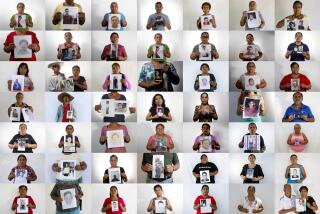Plan Past ‘the Day After’
We awoke recently to a new FBI alert telling Americans that Al Qaeda may be planning a “spectacular” terrorist attack intended to damage the U.S. economy and inflict large-scale casualties.
The unusually dire warning suggested that future Al Qaeda attacks would meet several criteria, including “high symbolic value, mass casualties, severe damage to the U.S. economy and maximum psychological trauma.” It sounds eerily like a description of a nuclear weapon being detonated on U.S. soil.
Though many Americans are finally taking seriously the very real possibility that a terrorist organization could one day acquire a nuclear weapon and detonate it in the United States, few have considered all the possible long-term consequences -- nor has the Bush administration’s new national security strategy.
This lack of foresight and preparedness not only leaves the country vulnerable to many horrific aftermath scenarios should the unthinkable happen, it could also have devastating effects on American foreign policy.
Most Americans now know that Russia’s nuclear stockpiles are under-secured, with hundreds of tons of weapon-grade uranium and plutonium scattered across that country. A few pounds of either material could arm a nuclear device capable of leveling almost any U.S. city. Also widely known is that terrorist organizations have tried to acquire stolen or diverted nuclear materials and warheads.
Should an organization such as Al Qaeda acquire a nuclear device, there is little reason to believe that it could be kept out of this country.
Unfortunately, most of the discussion and research in this area has focused solely on “the day before” or “the day after” such a terrorist attack.
The really scary stuff, however, lies just beyond that: the day after the day after.
A terrorist group would not even actually need to possess a second device; it would merely just have to say it did. It could claim it had several more hidden in other U.S. cities, ready to be used if the U.S. military did not start withdrawing from the Arabian peninsula -- a key Al Qaeda objective -- in, say, 72 hours.
Imagine what the outbound highways would look like near any U.S. city or the overall effect on our economy, our security, our civil rights, our way of life, our ability to project military power throughout the world.
Could U.S. leaders not comply with the terrorists’ demands, knowing the possible consequences in human and political terms? What would happen to all those U.S. military bases in the Middle East? What would become of Persian Gulf oil and the Western economies that are so dependent upon it?
The implications for the Navy alone are staggering. How far would the Navy’s forces have to pull back from the Middle East?
President Bush’s recently released National Security Strategy virtually ignores these considerations. Key concerns deserving his immediate attention include how to calm the nation in the event of nuclear blackmail or surprise attack, how to open and conduct negotiations with nuclear-armed terrorists and how to govern a nation truly under siege, preferably without sacrificing civil liberties or resorting to martial law.
Beyond that, the administration should begin developing contingency plans for “the day after the day after” to stabilize stock and financial markets, guarantee the basic functioning of the economy, relocate large numbers of potentially hysterical American citizens fleeing radioactive fallout, redeploy U.S. forces abroad rapidly should that prove necessary and, last but not least, provide medical and personal care for the wounded and dying.
The president should also work closely with the new Congress to redouble U.S. efforts to help fully secure Russia’s enormous nuclear stockpiles before they begin slipping into terrorist hands. That is, after all, one of the best ways to help ensure that a nuclear 9/11 never happens.
Otherwise, should the Bush administration continue to ignore these considerations, Americans may wake up one morning to the aftermath of a terrorist nuclear attack, an FBI alert warning that more attacks may be imminent and a White House without a plan for what to do next.
More to Read
Start your day right
Sign up for Essential California for news, features and recommendations from the L.A. Times and beyond in your inbox six days a week.
You may occasionally receive promotional content from the Los Angeles Times.






